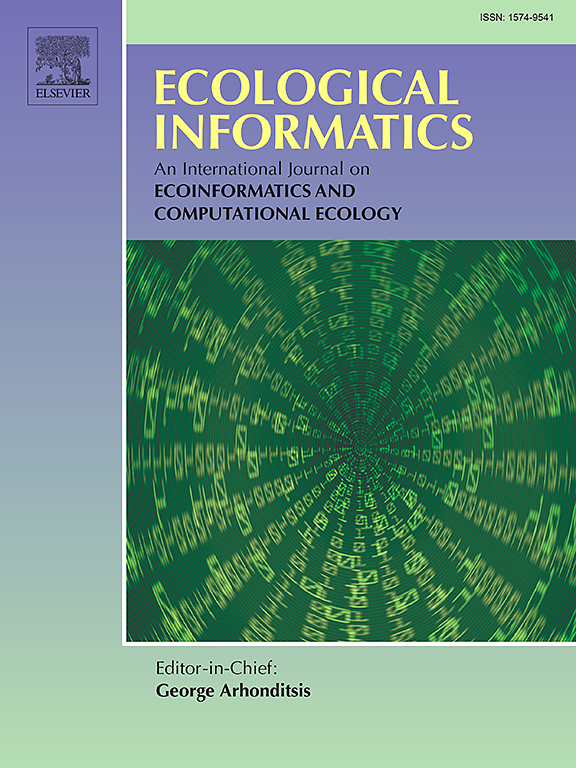Functional data analysis to describe and classify southern resident killer whale calls
IF 5.8
2区 环境科学与生态学
Q1 ECOLOGY
引用次数: 0
Abstract
The Southern Resident Killer Whale (SRKW) is an endangered population of whales found in the northeast Pacific. They have a vocal dialect unique from other killer whales, having a repertoire of distinct stereotyped calls. A framework for distinguishing SRKW call types using the frequency traces of the amplitude ridges from their spectrograms (termed frequency ridges) is proposed. The first step is the extraction of these ridges of SRKW calls using an Sequential Monte Carlo approach. Next, they are converted into functional data using B-spline functions. They are analyzed with a functional principal component (FPC) analysis to characterise the intrinsic variability of frequency ridges within a call type. The FPCs are able to capture the general patterns in the frequency ridges of the different SRKW call types. The FPCs are also used as the basis for call classification. Using a cross-validation procedure to assess the robustness of the classification, this framework proves to be successful for classification with some call types having an F1-score , but other calls less well discriminated. On balance, this approach showed reasonable performance given the small sample size available, and provides a useful contribution towards the development of a universal tool for call classification.
通过功能数据分析对南方虎鲸的叫声进行描述和分类
南居虎鲸(SRKW)是太平洋东北部的一个濒危鲸类种群。它们的声音方言与其他虎鲸不同,具有独特的定型叫声。本研究提出了一个框架,利用其频谱图中振幅脊线的频率轨迹(称为频率脊线)来区分虎鲸的叫声类型。第一步是使用序列蒙特卡洛方法提取 SRKW 呼声的频率脊。然后,使用 B-样条函数将其转换为函数数据。然后用功能主成分(FPC)分析法对其进行分析,以确定呼叫类型中频率脊的内在变化特征。功能主成分分析能够捕捉到不同 SRKW 呼声类型频率脊的一般模式。FPCs 也可用作鸣叫分类的基础。使用交叉验证程序来评估分类的稳健性,该框架被证明是成功的分类方法,某些呼叫类型的 F1 分数≥80%,但其他呼叫的区分度较低。总的来说,在样本量较小的情况下,这种方法表现出了合理的性能,为开发通用的呼叫分类工具做出了有益的贡献。
本文章由计算机程序翻译,如有差异,请以英文原文为准。
求助全文
约1分钟内获得全文
求助全文
来源期刊

Ecological Informatics
环境科学-生态学
CiteScore
8.30
自引率
11.80%
发文量
346
审稿时长
46 days
期刊介绍:
The journal Ecological Informatics is devoted to the publication of high quality, peer-reviewed articles on all aspects of computational ecology, data science and biogeography. The scope of the journal takes into account the data-intensive nature of ecology, the growing capacity of information technology to access, harness and leverage complex data as well as the critical need for informing sustainable management in view of global environmental and climate change.
The nature of the journal is interdisciplinary at the crossover between ecology and informatics. It focuses on novel concepts and techniques for image- and genome-based monitoring and interpretation, sensor- and multimedia-based data acquisition, internet-based data archiving and sharing, data assimilation, modelling and prediction of ecological data.
 求助内容:
求助内容: 应助结果提醒方式:
应助结果提醒方式:


